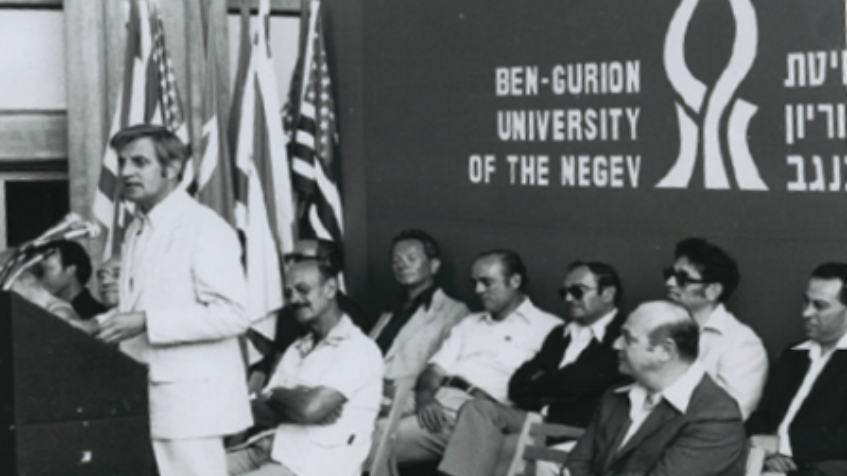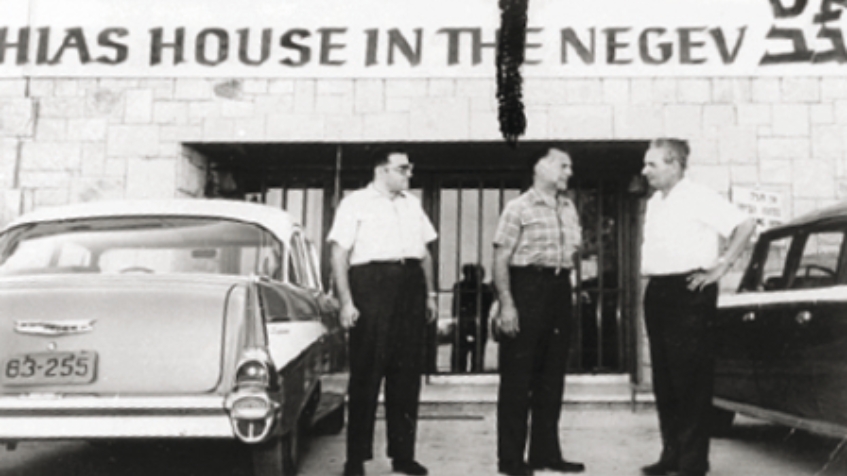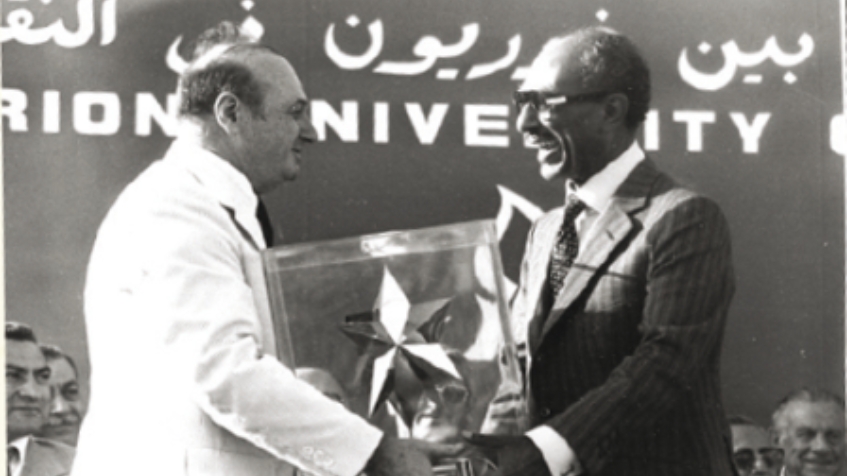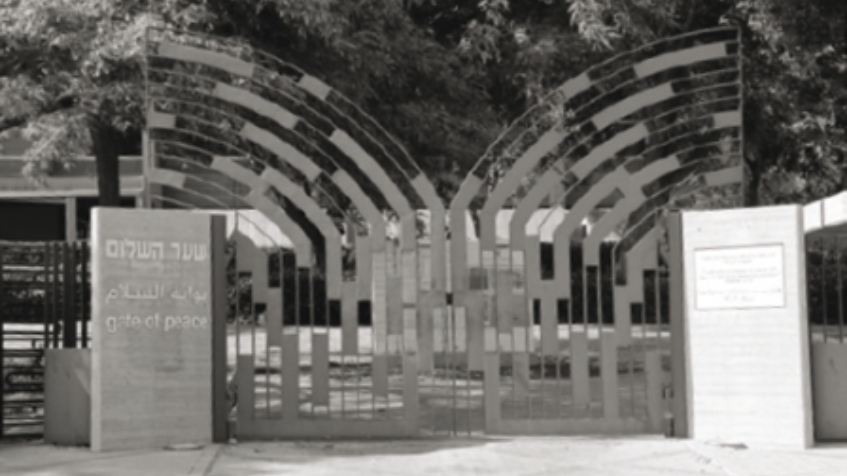

BGU Milestones
A glance at BGU's history
- The Government Committee for Science and Technology accepts the Gillis Committee’s recommendation to found a “University of the Negev.”

- The Department of Behavioral Sciences begins functioning. The first department of its kind in the country, it offers studies in psychology, sociology and anthropology.
- The Faculty of Natural Sciences is established.
- Due to lack of space, the first dean of students sets up offices on the lawn in a Bedouin tent.
- On the first anniversary of the death of David Tuviyahu, the campus - a former immigrant hostel - is renamed the David Tuviyahu Campus (located opposite Beer-Sheva’s hotel).
- The University acquires land for a new campus; a cornerstone is laid for the Zalman Aranne Central Library in 1970 — the first building to be erected.
- On May 30, 1972 the first president-designate of the University, Prof. Aharon Katzir, is killed in a terrorist attack at Lod Airport.
- Prof. Moshe Prywes becomes the first president of the University in 1972.
- In 1973, 33 students, teachers and administrative staff are killed in the Yom Kippur War.
- The Community Action Unit is established.
- Following the death of David Ben-Gurion in 1973, the Board of Governors officially changes the University’s name to Ben-Gurion University of the Negev.
- Prof. Moshe Prywes resigns as president in 1975 to assume full-time responsibility as the first dean of the medical school, which he dubbed “the Beer-Sheva Experiment.”
- The Faculty of Health Sciences is inaugurated. Guests at the ceremony include Prime Minister Golda Meir and Senator Edward M. Kennedy. Thirty-four students (selected from 662 applicants) comprise the first class of the medical school.
- Ambassador Yosef Tekoah becomes the University’s second president in 1975.
- As a result of Soviet policies toward Jewish emigration, the University adopts several academic Prisoners of Zion, appointing them professors in absentia.
- The Knesset passes the Ben-Gurion Law, stating that three institutions are to be established to perpetuate Ben-Gurion’s memory: the Ben-Gurion House in Tel Aviv, the Ben-Gurion Heritage Institute in Sede Boqer and the Institute for Desert Research, which is to be a part of Ben-Gurion University.
- The number of students rises from 1,300 to 4,038; among 700 faculty members, 150 are new immigrants.

- A Master Plan for the Development of the Negev to the Year 2000, co-sponsored by BGU, is presented to the Knesset.
- BGU, under the auspices of the Community Action Unit and together with the Ministry of Labor and Social Affairs, introduces 20 “Open Apartments” in disadvantaged neighborhoods where students will live rent-free in exchange for community service.
- Under the auspices of the World Health Organization, Iranian medical educators visit the Faculty of Health Sciences. As a result of the visit, two medical schools are set up in Iran along the lines of the “Beer-Sheva Experiment.”
- May 27, 1979 marks the historic visit of Israeli Prime Minister Menachem Begin and Egyptian President Anwar al Sadat to the BGU campus to sign a formal peace treaty.

- The Leon and Mathilde Recanati School for Community Health Professions is established.
- The first adobe house, heated entirely by solar energy, is planned and built by the desert architecture unit of the Jacob Blaustein Institute for Desert Research in Sede Boqer.
- Advanced Products, Ltd., known today as B.G. Negev Technologies and Applications, Ltd., (BGN) is established to advance knowledge and patents that are produced by BGU research.
- President Yosef Tekoah is appointed to the post of chancellor. He is succeeded as president by Major General Shlomo Gazit in 1981.
- The opening of the school year is postponed in 1982 as a result of the war in Lebanon.
- The Overseas Study Program begins operation. Today it is known as the Ginsburg-Ingerman Overseas Student Program.
- Prof. Chaim Elata becomes BGU’s fourth president, serving his first year in 1985 as both rector and president.
- The first Bedouin woman graduates from an Israeli university. Shifa el-Houzayil receives her degree in social work from BGU.
- A pre-academic course opens to meet the needs of the massive influx of new immigrants from the Soviet Union.
- The Gate of Peace is dedicated in 1989 in commemoration of the historic visit 10 years earlier of Menachem Begin and Anwar al Sadat.

- Prof. Avishay Braverman is elected president of the University in 1990.
- The Charlotte B. and Jack J. Spitzer Department of Social Work organizes a course in the Development of Support Systems for Immigrant Absorption.
- The Ben-Gurion National Center for Solar Energy is established.
- Final exams and the opening of the second semester are delayed as a result of the Gulf War in January 1991
- The Department of Life Sciences celebrates its 25th anniversary in 1991.
- Relative to its size, BGU has absorbed more immigrant researchers and students than any other academic institution in the country. Chairman Bob Arnow announces a special fund to aid immigrant students and faculty in memory of Chancellor Yosef Tekoah.
- BGU engages in various cooperative projects with Morocco, Egypt, Jordan and the Gaza Strip. Agreements for cooperation are signed with institutions in Argentina, Russia and France.
- UNESCO endorses the BGU-initiated International Program for Arid Land Crops. It is the first time a UN organization consults an Israeli institution for expertise.
- The number of students reaches 10,000.
- The Medical School is named the Joyce and Irving Goldman Medical School at a special ceremony in 1996.
- The Kreitman School of Advanced Graduate Studies is established in 1996, serving as the framework for all graduate studies.
- The School of Management is established in 1996 with five departments, offering for the first time a complete MBA degree.
- The Albert Katz International School for Desert Studies is established at the Blaustein Institute in Sede Boqer.
- The M.D. Program for International Health opens in collaboration with Columbia University Medical Center, later called the Medical School for International Health.
- The Zuckerberg Institute for Water Research is inaugurated. The Jacob Blaustein Institutes for Desert Research are reconfigured to incorporate three institutes of research.
- The pharmacology program is created, later to become the School of Pharmacy — the second one in Israel.
- In 2003, the Pilot’s Training Course is launched, providing a full academic curriculum for cadets of the Israel Air Force and resulting in a bachelor’s degree.
- The Eilat Campus opens as an integral part of BGU and regional development.
- The Honors MBA Program begins in the fall of 2003 – the only full-time, English-taught program of its kind in Israel.
- At a dedication ceremony in March 2005, the Beer-Sheva campus is named the Marcus Family Campus in honor of the generosity of Howard W. and Lottie R. Marcus.
- Prof. Rivka Carmi, M.D. becomes the president of BGU in 2006, the first and only woman to head an Israeli university.
- Deutsche Telekom opens its first and only research facility outside of Germany at Ben-Gurion University.
- Prof. Ya’akov Blidstein wins BGU’s first academic Israel Prize for Jewish Thought.
- BGU opens its facilities to residents of Northern Israel under attack by Hezbollah rockets in the Israel-Hezbollah War.
- For the first time ever, a conference under the auspices of the UN is held in Israel in November 2006. Deserts and Desertification: Challenges and Opportunities, organized by BGU’s Jacob Blaustein Institutes for Desert Research, is now a biannual event.
- A nationwide study reveals BGU is the number one choice of Israeli undergraduate students.
- BGU graduates Israel’s first female Bedouin physician.
- BGU establishes an accredited master’s degree program in Tourism and Hotel Management, the only one of its kind in Israel.
- The 11-year-old School of Management is named the Guilford Glazer School of Business and Management in 2007. In 2010, it becomes BGU’s fifth Faculty.
- The groundbreaking of the 150-acre Advanced Technologies Park (ATP) takes place in the presence of the Israeli prime minister and other dignitaries.
- BGU establishes an accredited master’s degree program in Emergency Medicine Management, the only one of its kind in Israel.
- BGU is awarded formal accreditation as a “Green Campus,” an initiative of the Ministry of Environmental Protection and the Council for Higher Education.
- In 2009, BGU’s student population grows to more than 20,000, reflecting an unprecedented increase, unparalleled by any other Israeli university.
- By 2009, BGU's student population grew to more than 20,000, reflecting unprecedented and unparalleled growth.
- As plans for the relocation of various IDF intelligence and technology to the south are consolidated, the University begins planning for a significant growth in enrollment and launches a massive building and renewal program to expand classroom, office and laboratory space.
- Plans are made for the expansion of the main Beer-Sheva campus by developing the adjacent North Campus. Chyutin Architects drew up a master plan.
- The Mandel social Leadership MBA program was created.
- An international program in Israel Studies was launched at the Ben-Gurion Research Institute for the Study of Israel and Zionism.
- The Ben-Gurion National Solar Energy Center in Sede Boqer was dedicated. As an additional part of BGU's Energy Initiative, A National Center of Research Excellence (I-Core) in the field of renewable liquid fuels, led by BGU researchers, was established in 2012
- The University Center for External Studies was established to strengthen the connection to the general public through a range of programs that promote intellectual, cultural and professional enrichment to the Negev's residents.
- BG Racing, a student engineering project to build a functioning race car, took first place among new entries at the international Formula SAE competition.
- PrePared Center for Emergency Response Research established to conduct cutting edge research and improve preparedness.
- The Advanced Technologies Park (ATP) adjacent to BGU's Marcus Family Campus opened in September 2013. The ATP, a partnership between the Beer-Sheva Municipality, BGU and Gav-Yam, grows quickly to become the home for a thriving hi-tech ecosystem. IBM, Oracle, Lockheed Martin, and Dell-EMC join Deutsche Telekom in establishing research centers at the ATP and sign research collaboration agreements with the BGU
- Cyberspark: The Israeli Cyber Innovation Arena, a collaboration between the National cyber Bureau, BGU, the Beer-Sheva municipality, the IDF and corporate entities, launched at the ATP to create a cybersecurity ecosystem surrounding the University and building on its strengths in this area. The Israeli government established its National Cyber Emergency Response Team at the ATP and the University launched a new MSC degree in Cyber Space Security.
- Beer-Sheva singled out in a 2015 study by the Brandeis International Business School and T3 Advisors as one of seven emerging global hubs of technology and life sciences.
- BGU Innovation Labs, an innovation center providing support to BGU student and alumni entrepreneurs, and the Inno-Negev Accelerator Program for start-ups, launched in 2016.
- Jusidman Science Center for Youth inaugurated in collaboration with the Rashi foundation, Beer-Sheva Municipality and the Ministry of Education to bring all the university's activities for science-oriented youth under one roof and develop new programs.
- BGNegev Technologies, BGU's technology transfer company filed its 1,000th patent.
- Dr. Howard and Lottie Marcus bequeathed a legacy gift of $400 million to BGU – the largest bequest ever made to any institution in Israel.
- BGU joined Israeli President Reuven Rivlin's "Israeli Hope" campaign to make Israeli society more inclusive, pledging to do even more to bring all sectors of society to the University.
- Prof. Daniel Chamovitz elected president of BGU and assumed office at the start of 2019.
- Work begins on the first buildings of the North Campus: student dorms.

